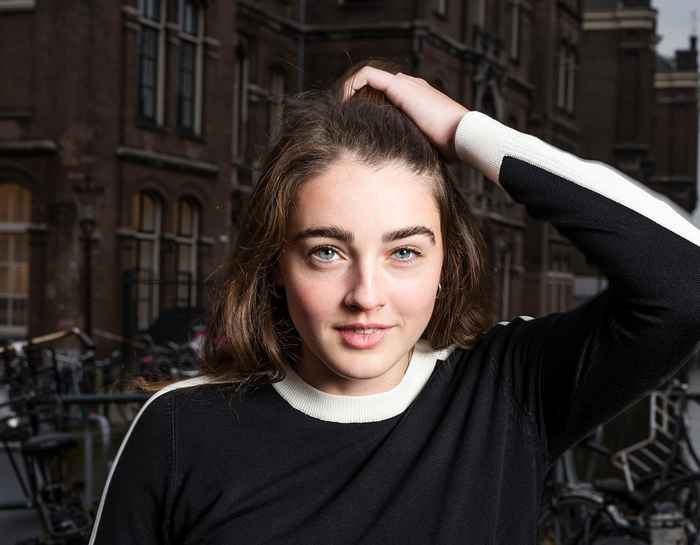Susanne Stevenhagen

Who? Susanne Stevenhagen (1999)
Studied: Bachelor's in Natural and Social Sciences.
First job: babysitting for neighbours.
Favourite place at the UvA: The Spectrum study association office at Science Park, because of the good vibes and because it almost feels like you are sitting outside.
Essential: my laptop.
Susanne Stevenhagen (1999) is a Bachelor's student in the Natural and Social Sciences programme. Her upbringing included both natural and social sciences. Languages on the one side, mathematics on the other. Enrolled in a Bachelor's programme, which she more or less stumbled into by chance, immediately after secondary school. The programme offered a nice broad start. After the interdisciplinary year, and following a great deal of advice and taster sessions, she chose Human Geography as her major from 21 fields of study. Susanne hopes to study in Berlin for six months before starting her Master's.
Are you good at making choices?
‘Sometimes, but not always. For me, the science track was a logical choice. The broad background you have as a Natural and Social Sciences student gives you many options for majors. There are 22 possible fields of study.
Natural and Social Sciences students are well known for being unable to make choices; consequently, we are given a lot of guidance. The taster sessions are the most important component. You spend a day in the major in which you are interested, to determine whether it is truly a good fit for you. For those who don't know how to make a choice, there are guidance workshops that you can sign up for. We have three study advisers, as well as a mentor for each group of 20 to 30 students. You can also get in touch with senior students through the study association, Spectrum. Basically, you have a huge network at your disposal if you get overwhelmed. People like me who find themselves unable to see the forest for the trees make extensive use of it.
I participated in taster sessions for many different fields of study, including Political Science, Sociology and Neurobiology. Ultimately, I chose Human Geography – the social side – as my major. You can also choose from a variety of tracks within the programme. The possibilities for advancing from my major to various Master's programmes appeal to me. I am interested in internationally-oriented Master's programmes because I want to do something that allows me to travel. I am already doing a little bit of preparation for choosing a Master's by taking extra electives. After my major, I would like to spend another six months studying in Berlin, and then it will be time to start a Master's.'
You don't choose this programme because you don't like anything, but because there is so much that you do like.
Is the programme an easy one?
‘No, I wouldn't say so. I often hear that Natural and Social Sciences is a kind of seventh year of secondary school, except you are not taking secondary school subjects. The programme may be broad, but it also has depth; you take courses that you would also take as a first-year Political Science or Physics student. That is why the major does not start until the second year, to ensure that you have a broad basis on which you can build. You must make a very deliberate choice to take many different courses at the same time. If you actually already know that you prefer social science courses, you will be stuck with a year of physics, chemistry and biology. That is quite challenging, as those are not easy subjects for people who are not interested in them.
You have a lot of options when it comes to Master's programmes.
What are the lecturers like?
I'm fortunate that the lecturers in the Natural and Social Sciences programme are very approachable. In the first year, we have a team of lecturers that works for the IIS, the Institute for Interdisciplinary Studies. This is the same team every year, and they know exactly how the interdisciplinary aspect of Natural and Social Sciences works. The lecturers also teach your seminars and, generally, one of them will be your first-year mentor as well. You get to know them really well and you can always turn to them for help.
The UvA is inextricably woven into the fabric of the city.
And what do you think of the UvA so far?
‘I get the impression that the UvA is a liberal university. And because the various campuses are so spread out around the city, the UvA is inextricably woven into the fabric of the city. In Natural and Social Sciences, you often go back and forth between Science Park, Roeterseiland and Oudemanhuispoort. I enjoy all of this biking around; you get to see a lot of the city and the various facets of the university. Natural and Social Sciences has a nice mix of students. These are people who are very focused on their studies, but at the same time are involved in lots of other stuff. Not hyper nerdy, just ordinary people with a social life. Most of them are really here to study. Personally, I work out a lot at the USC, the UvA's sports centre. Since Natural and Social Sciences is only offered at the UvA, the choice to attend this university was pretty obvious. I am also a student spokesperson at the UvA; I represent the Natural and Social Sciences programme during the Open Day and visit schools to give presentations, which I really love doing. During the Open Day, you see people who are in the exact same place as you were two years ago: people who really like loads of different things and therefore are temporarily stumped. I totally get it; I've been there myself.’